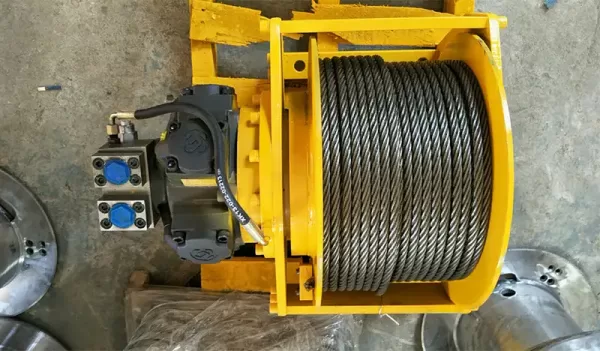Hydraulic winches are an essential piece of equipment for industries that demand reliable, high-torque performance in challenging environments. From marine operations to construction and mining, these winches are engineered to handle the heaviest loads with ease. GT Winch Group, known for its high-quality hydraulic winches, offers a range of solutions that can be customized to meet the demanding requirements of various industries. In this blog, we will explore the features, advantages, applications, and key considerations when choosing a hydraulic winch for your operations.
What is a Hydraulic Winch?
A hydraulic winch is a type of winch powered by hydraulic systems. These winches utilize hydraulic fluid to generate torque and move heavy loads. They consist of several critical components including a hydraulic motor, gearbox, drum, brake system, and control valves. Hydraulic winches are designed for high-efficiency performance in a variety of tough, demanding environments, including construction, mining, offshore, and military applications.
The most significant advantage of hydraulic winches over electric winches is their ability to provide consistent power at low speeds, making them ideal for extreme loads that could cause electric motors to stall or overheat. They also offer superior durability in harsh weather conditions, including wet, muddy, and corrosive environments.
Key Features of Hydraulic Winches
1. High Torque and Heavy-Load Capacity
Hydraulic winches are designed to handle extremely heavy loads, often ranging from 5 to 200 tonnes. Their high torque output is especially useful for tasks that require consistent pulling force, such as towing, anchoring, or lifting heavy materials. The hydraulic systems in these winches ensure that even the toughest jobs are completed efficiently without risk of motor burnout.
2. Durability in Harsh Environments
Whether you’re operating in a marine setting, mining site, or construction project, hydraulic winches excel in challenging environments. With IP68-rated hydraulic motors, they are sealed to protect against dust, water, and corrosion. This makes them particularly suitable for operations in wet or muddy environments where electric winches would face severe performance issues.
3. Inherent Overload Protection
Hydraulic winches come equipped with safety features, including overload protection and fail-safe brakes. These features are built into the hydraulic system, ensuring that the winch automatically relieves pressure during an overload condition to prevent mechanical damage. Unlike electric winches, which may require additional protection against motor burnout, hydraulic winch offer enhanced safety without extra components.
4. Continuous Operation Without Overheating
Hydraulic systems are designed to operate continuously without the risk of overheating. This makes them ideal for demanding tasks that require round-the-clock operation, such as offshore operations or heavy-duty construction work. In contrast, electric winches often require downtime to prevent motor damage from prolonged use.
5. Customization Options
Hydraulic winches can be tailored to meet specific needs. Options include different drum coatings for anti-corrosion protection, speed reducers for variable control, and multi-layer spooling for efficient wire rope storage. Additionally, hydraulic winches can be mounted on various platforms, such as trucks, trailers, or skid-mounted installations, depending on the application.
Common Applications of Hydraulic Winches
1. Marine Operations
Hydraulic winches are widely used in the marine industry for tasks such as towing, anchoring, and mooring. Whether on a ship or an offshore platform, these winches provide the necessary power to secure vessels or perform deck operations. The hydraulic systems ensure reliable performance, even under extreme conditions, such as heavy sea states or adverse weather.
2. Construction and Infrastructure
On construction sites, hydraulic winches are used for lifting and pulling heavy materials, such as steel beams, concrete slabs, and machinery. The high torque capacity of hydraulic winches allows them to handle significant loads efficiently, making them indispensable in the construction of bridges, skyscrapers, and other large infrastructure projects.
3. Mining Operations
In the mining industry, hydraulic winches play a critical role in material handling, hoisting, and transporting goods both underground and on the surface. Their ability to lift heavy materials, such as ore or equipment, makes them essential for efficient mining operations. Additionally, their durability and resistance to environmental factors like dust and moisture make them ideal for underground mining environments.
4. Oil and Gas Industry
Hydraulic winches are crucial in the oil and gas industry, particularly in offshore drilling and pipeline installations. These winches are used for tasks such as securing rigs, lifting heavy equipment, and pulling cables. Their ability to operate in harsh, corrosive environments and handle large loads makes them indispensable on oil platforms and drilling rigs.
5. Military and Vehicle Recovery
Hydraulic winches are frequently used in military and off-road vehicle recovery. Installed on trucks or specialized recovery vehicles, they provide the pulling force needed to recover vehicles stuck in rough terrain. These winches offer durability and performance in situations where reliability is critical, such as on military expeditions or rescue operations.
Advantages of Hydraulic Winches Over Electric Winches
Hydraulic winches offer several advantages over electric winches, making them the preferred choice in many heavy-duty industries:
-
Higher Torque: Hydraulic systems are capable of generating much higher torque compared to electric motors, allowing them to handle extremely heavy loads without risk of stalling.
-
Durability: Hydraulic winches are less susceptible to damage from dust, water, or corrosion, which makes them ideal for environments where electric winches would fail.
-
Continuous Operation: Hydraulic systems can run continuously, whereas electric motors often require breaks to cool down during prolonged heavy use.
-
Inherent Safety: Hydraulic winches have built-in overload protection, reducing the risk of mechanical failure and improving safety on the job.
Conclusion
Hydraulic winches are powerful, reliable, and essential for a wide range of industries that require heavy-duty lifting, pulling, and towing. Whether you need a winch for marine operations, construction, mining, or military use, hydraulic winches from GT Winch Group are designed to meet the most demanding requirements. With features such as high torque, durability, overload protection, and continuous operation, hydraulic winches provide the necessary power and performance to get the job done efficiently and safely.




